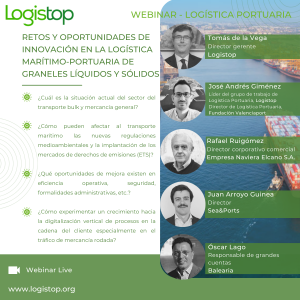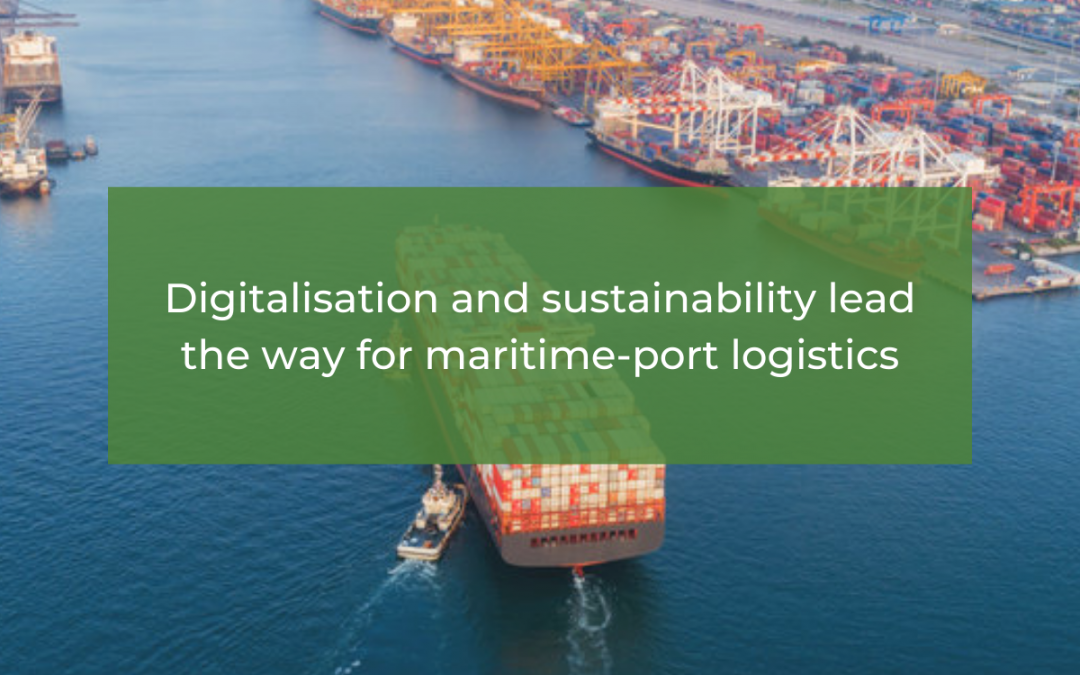- The current context, marked by uncertainty, poses a scenario in which even short-term prediction is complex.
- New trends and regulations will mark the future of maritime-port logistics.
- The application of different digitalisation solutions allows for the improvement of optimisation and service, leading to more efficient and sustainable logistics.
The Logistop Webinar “Challenges and opportunities for innovation in maritime-port logistics of liquid and solid bulk cargoes” addressed the current situation of maritime transport, with the aim of finding out what challenges the sector is facing from different perspectives, mainly from digitalisation and sustainability.
For this, we have counted with the participation of Rafael Ruigómez, Corporate Commercial Director at Empresa Naviera Elcano S.A., Juan Arroyo Guinea, Director at Sea&Ports, y Óscar Lago, Head of Key Accounts at Baleària, as well as with the presentation and moderation of Tomás de la Vega, Managing Director at Logistop, and José Andrés Giménez Maldonado, leader of the Port Logistics working group of Logistop, and Port Logistics Director at Fundación Valenciaport.

Towards a new, more energy-efficient and environmentally friendly merchant fleet
In his speech, Rafael Ruigómez provided an overview of the current situation of both the fleet and the existing options which, although not all of them are technologically feasible for immediate implementation, they are feasible for implementation in the coming years.
He also stressed the importance of developing a more sustainable world merchant fleet, based, on the one hand, on awareness and corporate social responsibility and, on the other, on compliance with the new international regulations that are being implemented and will be implemented in the coming years.
Global commitments to environmental sustainability will require a major effort from the whole industry, not just shipping. This will lead us, as Rafael points out, to see a major transformation of the world’s merchant fleet in the coming years, moving towards a technologically innovative and more sustainable sector. All this in addition to the challenge of overcoming dependence on fossil fuels.
“In the coming years we will see a major transformation of the world’s merchant fleet towards a technologically innovative and much more environmentally friendly sector.”
Rafael Ruigómez, Corporate Commercial Director, Empresa Naviera Elcano S.A.
Innovation and digitisation of processes for optimisation
For his part, Juan Arroyo highlighted the important role that innovation (both at a technical, personnel and commercial level) and digitalisation play in achieving optimisation. An optimisation that will allow us, as Juan analysed, to reduce operating time, increase the use of the vessel and improve customer satisfaction. Aspects that imply a reduction in economic and pollution costs.
Along the same lines as Rafael, Juan emphasised the fact that the great impact produced by maritime transport is mainly due to its large transport capacity. However, its intrinsic efficiency means that the unit pollution per tonne or per container is much more efficient. To conclude his speech, he stressed the importance of working together between the three transport industries to reduce CO2 and greenhouse gas emissions.
“Good optimisation based on innovation and digitalisation will allow us not only to reduce economic costs, but also pollution levels.”
Juan Arroyo Guinea, Director, Sea&Ports
Innovation challenges and opportunities
Finally, Óscar Lago explained a series of innovation challenges that Baleària has faced (and is facing), such as improving the optimisation of the efficiency of the door-to-door logistics supply chain through the projection of the control tower; the digitalisation of various communication channels (web portal, boarding control and mobile app); and the development of the Green and Connected Ports Project, installing measuring equipment on sensorised vessels whose data is integrated into the control tower.
These challenges they are tackling have provided them with the necessary information to improve vessel operations, control engine parameters and provide more efficient and sustainable navigation.
“The challenges of innovation and digitalisation that we are tackling allow us to have the necessary information to be able to improve ship operations, control engine parameters and provide more efficient and sustainable navigation.”
Óscar Lago, Head of Key Accounts, Baleària
About Logistop
Logistop is the benchmark workspace for collective innovation through the realisation of projects hand in hand with our members. Transforming the entire supply chain into a more efficient and sustainable one. All this with the aim of articulating and carrying out innovation projects among the members, without excluding the possibility of collaborating with or receiving support from certain organisations outside Logistop.

